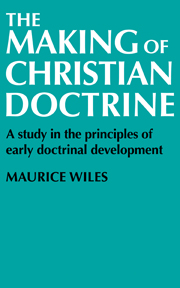Book contents
- Frontmatter
- Contents
- List of Abbreviations
- 1 The Development of Doctrine: The Nature of the Problem
- 2 Motives for Development in the Patristic Age
- 3 Scripture as a Source of Doctrine
- 4 Lex Orandi
- 5 Soteriology
- 6 The Form of the Arguments
- 7 The Assimilation of New Ideas
- 8 Towards a Doctrine of Development
- Index
3 - Scripture as a Source of Doctrine
Published online by Cambridge University Press: 16 October 2009
- Frontmatter
- Contents
- List of Abbreviations
- 1 The Development of Doctrine: The Nature of the Problem
- 2 Motives for Development in the Patristic Age
- 3 Scripture as a Source of Doctrine
- 4 Lex Orandi
- 5 Soteriology
- 6 The Form of the Arguments
- 7 The Assimilation of New Ideas
- 8 Towards a Doctrine of Development
- Index
Summary
Scripture as a source of Christian doctrine—it is tempting for one nurtured in the Reformed tradition to change the indefinite article into the definite. Is not sola scriptura the ground of Christian truth? Would it not therefore be truer to speak of Scripture as the source of Christian doctrine? However great one's sympathy with the concept of sola scriptura as a dogmatic principle, such a change would clearly falsify the facts with which we are here concerned and would also obscure the primary purpose of this section of our inquiry. It would falsify the facts because the emergence of the Scriptures and the development of doctrine were not successive stages in Christian history; in the earliest period of that history the two processes went on simultaneously. Scripture in the sense in which we use that word today could not be the source of the earliest developments in Christian doctrine for the very obvious reason that it was not then in existence in its present form to fulfil that role. But the change from speaking of Scripture as a source of Christian doctrine to speaking of it as the source would also obscure my intention in another way. To speak of it as the source of Christian doctrine would suggest to our minds the general content of the biblical revelation as a whole, but I shall be more concerned in this chapter with the influence of the written form upon the way in which doctrine developed.
- Type
- Chapter
- Information
- The Making of Christian DoctrineA Study in the Principles of Early Doctrinal Development, pp. 41 - 61Publisher: Cambridge University PressPrint publication year: 1967

